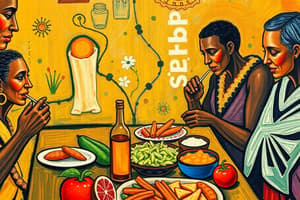Podcast
Questions and Answers
How does food serve as a symbol of cultural identity?
How does food serve as a symbol of cultural identity?
- It depicts regional history and values through traditional dishes. (correct)
- It has no significant role in social interactions.
- It purely showcases modern food trends.
- It is only representative of nutritional value.
What role do celebratory foods play in social interactions?
What role do celebratory foods play in social interactions?
- They are primarily consumed in private settings.
- They mark important life events like weddings and holidays. (correct)
- They emphasize individual experiences over communal ones.
- They are exclusively limited to birthdays and anniversaries.
What can sharing food indicate in various cultures?
What can sharing food indicate in various cultures?
- It is a sign of competition and rivalry.
- It reflects wealth and social status exclusively.
- It indicates hospitality and friendship. (correct)
- It shows a lack of interest in the well-being of others.
How can dietary restrictions shape social dynamics?
How can dietary restrictions shape social dynamics?
What effect does globalization have on local eating customs?
What effect does globalization have on local eating customs?
In what way does technology facilitate food-related social interactions?
In what way does technology facilitate food-related social interactions?
What is a common result of shared meals on dietary choices?
What is a common result of shared meals on dietary choices?
What role do specific rituals associated with meals commonly play in various cultures?
What role do specific rituals associated with meals commonly play in various cultures?
Flashcards are hidden until you start studying
Study Notes
Food and Social Interactions
-
Cultural Significance of Food
- Food acts as a symbol of cultural identity.
- Traditional dishes reflect regional history and values.
- Celebratory foods mark important life events (e.g., weddings, holidays).
-
Social Gatherings
- Meals often serve as a medium for social bonding.
- Family dinners and communal eating promote togetherness.
- Cultural festivals highlight food-sharing practices.
-
Etiquette and Norms
- Different cultures have unique dining etiquette (e.g., table manners, seating arrangements).
- Sharing food is a common practice in many cultures, indicating hospitality and friendship.
- Specific rituals may accompany meals (e.g., prayers, toasts).
-
Food as Communication
- Food choices can signal social status and group belonging.
- Dietary restrictions (e.g., vegetarianism, religious dietary laws) can shape social dynamics.
- The act of cooking for others is often seen as an expression of care.
-
Impact of Globalization
- Global food trends influence local eating habits and customs.
- Fusion cuisine reflects the blending of different cultural practices.
- Fast food culture can alter traditional dining rituals.
-
Technology and Social Interaction
- Social media platforms facilitate sharing food experiences (e.g., food photography).
- Online communities can create new forms of social interaction centered around food.
- Food delivery apps change the dynamics of communal eating.
-
Health and Nutrition
- Shared meals can influence dietary choices and health behaviors.
- Social support is essential for maintaining healthy eating habits.
- Cultural beliefs about health can impact food choices and preparation methods.
Cultural Significance of Food
- Food symbolizes cultural identity, often representing a community's heritage and values.
- Traditional dishes showcase regional history, frequently passed down through generations.
- Celebratory foods are integral to significant life events, such as weddings and holidays.
Social Gatherings
- Organized meals serve as opportunities for social bonding among family and friends.
- Family dinners foster togetherness, reinforcing familial relationships.
- Cultural festivals often feature food-sharing practices that enhance community connections.
Etiquette and Norms
- Each culture possesses unique dining etiquettes, influencing behaviors such as table manners and seating arrangements.
- Sharing food is a prominent practice in various cultures, illustrating hospitality and strengthen friendships.
- Meals may be accompanied by specific rituals, such as prayers or toasts, adding cultural significance.
Food as Communication
- Choices in food can reflect social status and affiliations with particular groups.
- Dietary restrictions, like vegetarianism or religious dietary laws, play a role in forming social dynamics.
- Cooking for others is viewed as an act of care, emphasizing interpersonal bonds.
Impact of Globalization
- Global food trends significantly influence local dining practices and cultural customs.
- Fusion cuisine emerges from the blending of diverse culinary influences, showcasing cultural interchange.
- The rise of fast food culture can disrupt traditional dining rituals and family meal practices.
Technology and Social Interaction
- Social media enables users to share food experiences visually, contributing to culinary trends.
- Online communities centered around food create new forms of social interactions and connections.
- Food delivery apps transform the traditional dynamics of communal eating, impacting social gatherings.
Health and Nutrition
- Shared meals can influence dietary choices, promoting healthier eating habits within social groups.
- Social support plays a crucial role in maintaining healthy eating behaviors among individuals.
- Cultural beliefs regarding health significantly affect food choices, preparation methods, and consumption practices.
Studying That Suits You
Use AI to generate personalized quizzes and flashcards to suit your learning preferences.




